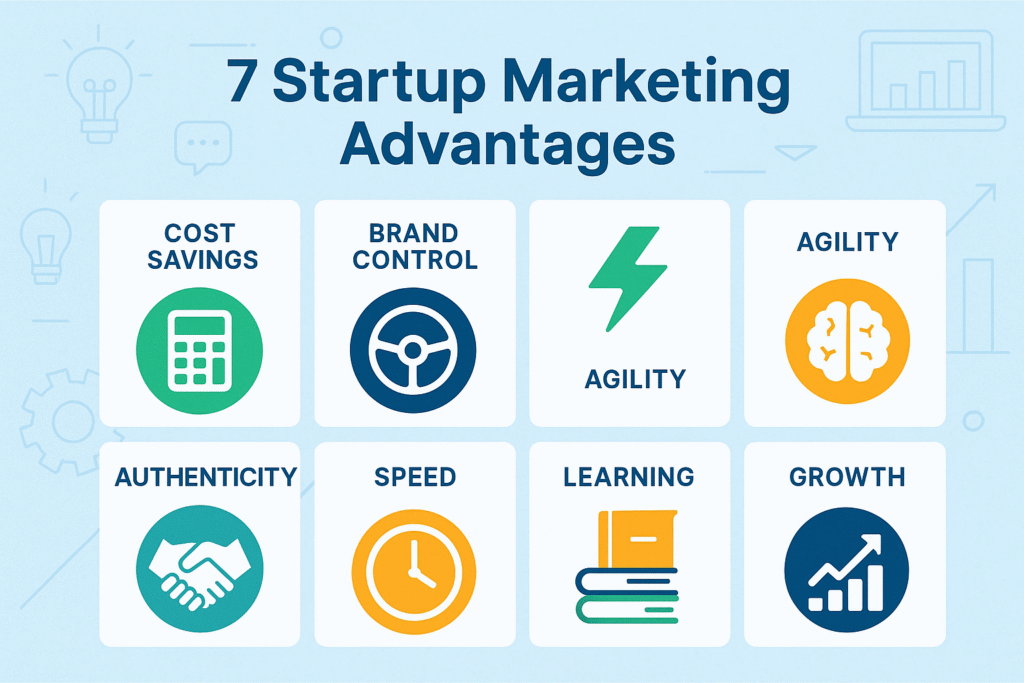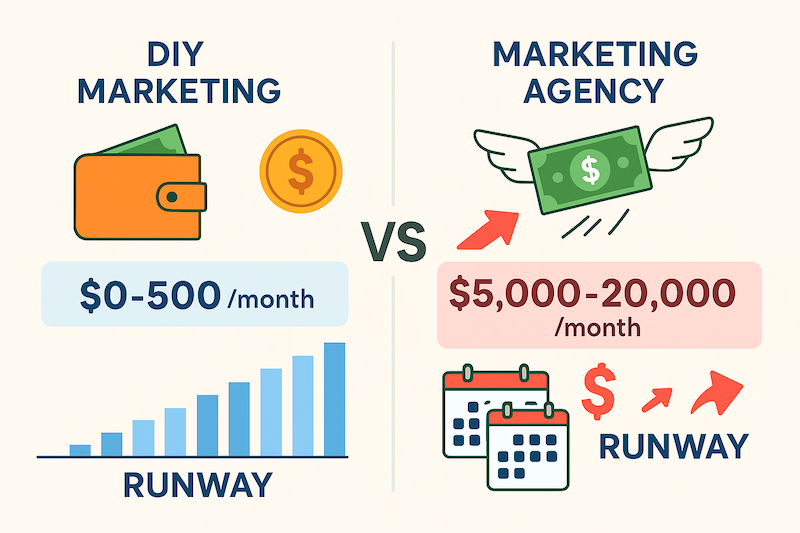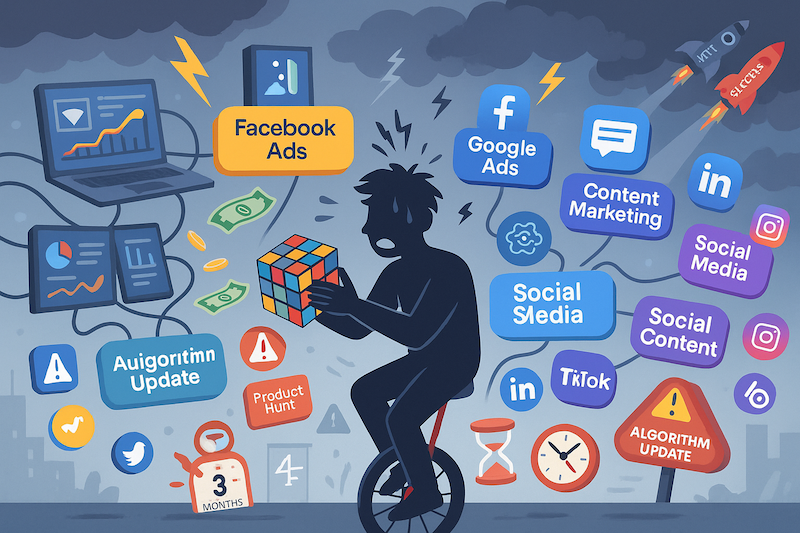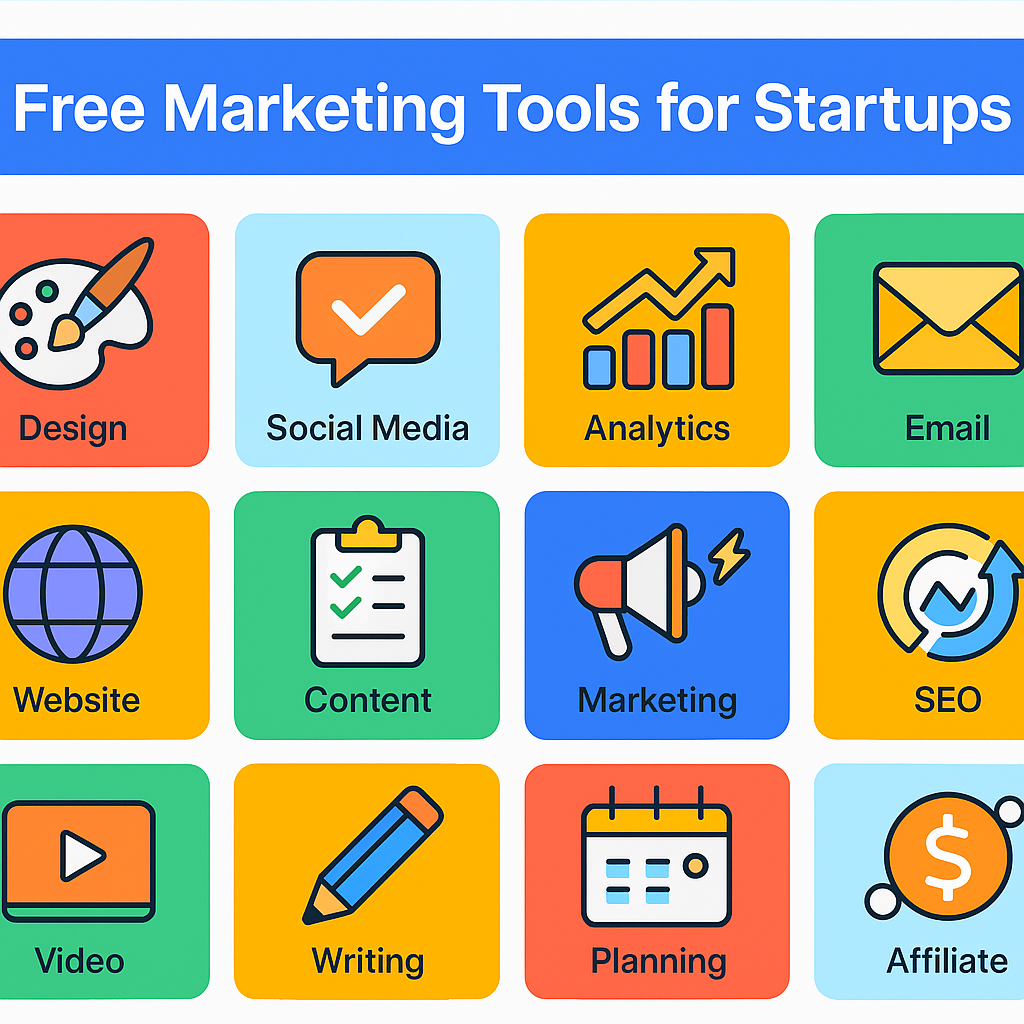Picture this: It’s 2 AM, and you’re hunched over your laptop in what used to be your dining room but now serves as “headquarters.” Your co-founder is asleep on the couch (again), and you’re trying to figure out why your brilliant product isn’t getting the attention it deserves. Then your advisor drops the bomb: “You need to invest in marketing. Maybe hire an agency?”
You check your bank balance. Crickets.
Here’s the thing—I’ve been exactly where you are. So have thousands of other founders who’ve built million-dollar companies without writing a single check to a marketing agency. The question isn’t whether you can afford NOT to market (you can’t), but whether you can implement proven startup marketing strategies yourself without going broke or losing your sanity.
Spoiler alert: You absolutely can build a marketing machine that works. However, (and this is a significant warning) it’s not about posting random content and hoping for the best. Let’s dive into the fundamental startup marketing strategies that move the needle—and how to implement them without hemorrhaging cash or your precious time.

Table of Contents
Why Your Marketing Can’t Wait (Even If Your Budget Says Otherwise)
Before we get into the nitty-gritty of DIY startup marketing strategies, let’s address the elephant wearing a suit in the corner: why marketing feels like this urgent, expensive necessity that somehow always gets pushed to “next quarter.”
Here’s the brutal truth—in today’s market, you’re not just competing with other startups. You’re fighting for attention against Netflix, TikTok, and that friend who posts way too many vacation photos. Your potential customers see over 5,000 ads per day. Without strategic branding and proven startup marketing strategies, your revolutionary idea becomes digital wallpaper.
But here’s what most “marketing experts” won’t tell you: startup marketing strategies aren’t about having the biggest budget or the flashiest campaigns. It’s about understanding your customer so deeply that when they see your message, they think, “Finally, someone gets it.” For comprehensive insights on building effective marketing strategies, check out our guide on content marketing fundamentals.
Think about it this way: startup marketing strategies are the bridge between your brilliant solution and the people who desperately need it. Without that bridge, you’re essentially building a beautiful house on an island with no way for visitors to reach it.

The Case for DIY Startup Marketing Strategies: 7 Key Advantages
1. You Know Your Story Better Than Anyone
When you handle startup marketing strategies in-house, you maintain complete control over your brand narrative. No one understands your “why,” your late-night breakthrough moments, or the problem you’re solving better than you do. This intimate knowledge translates into messaging that feels real, not like it was crafted by someone who learned about your company from a PowerPoint deck.
I’ll never forget talking to Sarah, who founded a productivity app for working parents. When she tried explaining her vision to an agency, they kept pushing generic “work-life balance” messaging. But Sarah’s real story—staying up until 3 AM trying to organize her family’s chaos while building her startup—that was pure gold. When she shared that authentic struggle in her startup marketing strategies, her audience connected instantly.
2. Your Runway Just Got Longer
Let’s talk about everyone’s favorite topic: money (or the lack thereof). Marketing agencies typically charge between $5,000 $20,000+ per month, depending on what bells and whistles you want. For most startups, that’s not just expensive—it’s runway-shortening, ramen-extending, stress-inducing expensive.
Here’s some quick math that might make you feel better: if you save $10,000 per month by handling your startup marketing strategies internally, that’s an extra 6-12 months of runway. Suddenly, those YouTube tutorials on Facebook ads don’t seem so intimidating, right?
But here’s the real kicker—every dollar you don’t spend on agencies is a dollar you can invest in your product, your team, or that crucial hire who’ll help you scale. For more detailed budget planning strategies, see our comprehensive guide on startup financial management that covers marketing budget allocation.
3. You Can Pivot Faster Than a Caffeinated Developer
Here’s where startups have a massive advantage over big companies:
You can change direction without committee meetings, approval chains, or “let me circle back with the team.” When your startup marketing strategies aren’t working, you can pivot them over lunch. When a new trend emerges, you can test it at dinner.
I watched one startup founder completely restructure their messaging after a single customer call revealed they’d been targeting the wrong pain point entirely. Within 48 hours, they had new landing pages, updated ad copy, and a completely different value proposition. Try doing that with a traditional agency.
4. You’re Building Skills That Pay Dividends Forever
Managing your startup marketing strategies isn’t just about saving money today—it’s about building superpowers for tomorrow.
Every A/B test you run, every campaign you optimize, every customer insight you uncover becomes part of your founder DNA.
When you eventually do hire marketing talent (and you probably will), you’ll be able to spot BS from a mile away. You’ll know what good looks like because you’ve lived in the trenches. Additionally, understanding your customers at this granular level enables you to be a better product builder, a more compelling fundraiser, and a stronger leader overall.
To accelerate your learning curve, explore our detailed article on essential marketing skills for entrepreneurs.
5. Authentic Connection Beats Corporate Polish
Your startup marketing strategies have something that agencies can never replicate: authenticity. When you share your struggles, victories, and behind-the-scenes moments, people connect with the real human behind the brand. This authentic connection often converts better than any polished campaign.
6. Immediate Feedback Loop
With DIY marketing strategies, you’re directly connected to customer feedback. You see every comment, read every email, and experience every reaction firsthand. This immediate feedback loop allows you to adjust your messaging, products, and approach in real-time.
7. Complete Creative Control
Your startup branding strategies reflect your vision without compromise. You don’t have to explain why certain messaging matters or why specific imagery aligns with your brand. You control every aspect of how your story is told.
The Reality Check: When DIY Gets Messy
Okay, let’s take a step back from the DIY cheerleading for a minute. While handling your startup marketing strategies can be incredibly rewarding, it’s not all viral videos and hockey-stick growth curves. Some very real challenges can make you question your life choices at 3 AM.

The “I Have No Idea What I’m Doing” Syndrome
Modern startup marketing strategies are akin to trying to solve a Rubik’s Cube while riding a unicycle in a thunderstorm. You’ve got SEO (which changes faster than fashion trends), content marketing, paid advertising across seventeen different platforms, email marketing, social media, conversion optimization, and whatever new thing launched on Product Hunt this morning.
The learning curve isn’t just steep; it’s vertical. And here’s the brutal truth: while you’re figuring out why your Facebook ads are burning cash with no conversions, your competitors might be scaling with startup marketing strategies you’ve never heard of.
I’ve seen brilliant founders spend three months learning Google Ads only to discover they were targeting keywords that would never convert. That’s three months of runway and opportunity cost that could have been avoided with the right expertise.
The Juggling Act that Nobody Talks About
Here’s what no one tells you about being a founder: you’ll become a master juggler, except all the balls are on fire, and occasionally someone throws in a chainsaw. Adding startup marketing strategies to this mix is like trying to juggle while also learning to play the piano.
Your product needs attention. Your team needs direction. Investors need updates. Customers need support. And now marketing needs a consistent, strategic focus too. Something’s going to drop, and it’s usually the thing that doesn’t scream the loudest, which, unfortunately, is often marketing.
Learn how to better manage your time and priorities with our guide on time management for startup founders.
The result? Half-hearted social media posts, inconsistent messaging, and that nagging feeling that you’re always behind on the “marketing stuff.”
You’re Too Close to See the Forest
When you live and breathe your product 24/7, you develop what I call “founder’s tunnel vision.” You know your solution so intimately that you assume everyone else understands it too. You use industry jargon as if it were common language. You focus on features that excite you but might not matter to customers.
Fresh eyes often catch things you’ve been blind to for months. Like the fact that your homepage explains what you do instead of why anyone should care. Or that your startup marketing strategies appeal to you but confuse your actual target market.
Sometimes you need someone who’s never seen your product to say, “I have no idea what this does,” to realize your marketing has been talking to the wrong audience in the wrong language.
Resource and Tool Limitations
Effective startup marketing strategies often require tools, technologies, and resources that can be expensive for individual purchases but cost-effective when spread across an agency’s client base. From premium analytics platforms to design software and advertising spend, the costs can add up quickly.
The Legends Who Made It Work: Real Stories, Real Results
Enough theory. Let’s discuss the startups that successfully implemented DIY startup marketing strategies and emerged victorious. These aren’t fairy tales—they’re real companies that built marketing machines from their kitchen tables and basements.
Buffer: Transparency as One of Their Core Startup Marketing Strategies
Buffer’s founders, Joel Gascoigne and Leo Widrich, built their social media management platform using content marketing and radical transparency as their primary marketing strategies for the startup. They shared everything—from revenue numbers to employee salaries—creating unprecedented trust with their audience. Their blog became a go-to resource for entrepreneurs, driving organic growth without traditional advertising.
Their approach was simple but powerful: solve problems publicly, share learnings openly, and build relationships before trying to sell. These startup marketing strategies helped them grow to millions of users and eventually led to their acquisition by Vista Equity Partners.
Dollar Shave Club: Viral Content Among Top Startup Marketing Strategies
Michael Dubin’s Dollar Shave Club famously disrupted the razor industry with a single viral video that cost just $4,500 to produce. Dubin wrote, directed, and starred in the video himself, creating authentic, humorous content that resonated with frustrated consumers tired of overpriced razors.
The video garnered millions of views and thousands of subscribers within days, proving that creativity and authenticity often trump big budgets. Their DIY approach to content creation became their signature among startup marketing strategies, leading to a $1 billion acquisition by Unilever.
Zoom: Product-Led Growth as One of Their Primary Startup Marketing Strategies
Eric Yuan’s Zoom took a different approach to startup marketing strategies: they let their product do the talking. Instead of spending heavily on traditional marketing, they focused obsessively on user experience and word-of-mouth growth. Their freemium model and focus on reliability created a viral coefficient that traditional marketing couldn’t match.
When the pandemic hit, Zoom’s product-focused approach among its startup marketing strategies paid dividends, as its user base exploded from 10 million to 300 million daily meeting participants, mainly through organic growth and referrals.

Your DIY Marketing Toolkit: Essential Resources
Free and Low-Cost Tools
Content Creation:
- Canva for graphic design
- Buffer or Hootsuite for social media scheduling
- Google Analytics for website insights
- Mailchimp for email marketing
- WordPress or Ghost for blogging
SEO and Research:
- Google Keyword Planner for keyword research
- Ubersuggest or AnswerThePublic for content ideas
- Google Search Console for SEO monitoring
- Hotjar for user behavior analysis
Learning Resources
Educational Platforms:
- HubSpot Academy (free certifications)
- Google Digital Marketing Courses
- Coursera and Udemy marketing courses
- YouTube tutorials and case studies
- Marketing podcasts like “Marketing School” and “This Week in Startups“
Industry Publications:
Building Your Marketing Foundation
Step 1: Define Your Brand Identity. Before implementing any tactical startup marketing strategies, establish a solid brand foundation. What problem do you solve? Who is your ideal customer? What makes you different? Create a simple brand guidelines document covering your voice, tone, visual style, and key messages.
Step 2: Select Your Channels Carefully for Your Startup’s Marketing Strategies. Don’t try to be everywhere at once. Research where your target audience spends time and focus on 2-3 channels initially. Master these startup marketing strategies before expanding to additional platforms.
Step 3: Create a Content Calendar. Consistency beats perfection in marketing. Develop a realistic content calendar that you can maintain over the long term. It’s better to post quality content twice a week consistently than to post daily for a month and then disappear.
Step 4: Measure What Matters. Establish key performance indicators (KPIs) that align with your business goals. Focus on metrics that drive revenue: lead generation, conversion rates, customer acquisition cost, and lifetime value.
For a deeper dive into marketing analytics, check our comprehensive guide on startup marketing metrics and KPIs.
When to Consider Professional Help
While DIY marketing can be effective, there are situations where professional help makes sense:
You’re scaling rapidly and need specialized expertise to manage complex campaigns across multiple channels.
You’re entering new markets where local knowledge and cultural understanding are crucial for your startup marketing strategies.
You have complex B2B sales cycles that require sophisticated lead nurturing and account-based marketing strategies.
You’ve reached the limits of your internal capabilities and need fresh perspectives or advanced technical skills for your startup marketing strategies.
The key is timing. Many successful startups begin with DIY marketing to establish their foundation, then selectively bring in professional help as they grow and their needs become more sophisticated.
Making the Decision: A Framework for Startup Founders
Ask yourself these critical questions about your startup marketing strategies:
- Budget Reality Check: Can you afford agency fees without significantly impacting other crucial areas of your business?
- Time Assessment: Do you have team members who can dedicate sufficient time to marketing without neglecting other responsibilities?
- Skill Inventory: What marketing capabilities exist within your current team, and what gaps need to be filled?
- Market Complexity: How sophisticated is your target market, and what level of marketing expertise do your competitors employ?
- Growth Stage: Are you in the early validation phase, where authenticity matters most, or the scaling phase, where efficiency and expertise become critical for your startup marketing strategies?
The Hybrid Approach: Best of Both Worlds
Consider starting with a hybrid model: handle core brand development and content creation internally, while outsourcing specialized tasks such as paid advertising management, SEO technical implementation, or graphic design. This approach allows you to maintain brand control while accessing expertise in areas where mistakes can be costly.
You might also consider working with freelancers or consultants on a project basis rather than committing to full-service agency relationships. For specialized consultation in strategic partnerships and market-specific expertise, particularly in emerging markets, consider reaching out to Trendhypes.com for tailored advice. This gives you flexibility to scale up or down based on results and budget constraints.
Your Next Steps: Building Marketing Momentum
Whether you choose the DIY route or decide to work with professionals, success requires action. Here’s your immediate action plan:
Week 1: Audit your current marketing efforts and identify your most significant opportunities and gaps.
Week 2: Define Your Brand Foundation and Ideal Customer Profile.
Week 3: Choose your primary marketing channels and create content calendars.
Week 4: Implement tracking and measurement systems.
Month 2 and beyond: Execute consistently, measure results, and iterate based on data from your startup marketing strategies.
Remember, startup marketing strategies are not a destination but a journey. Every successful startup began with imperfect marketing efforts that improved over time through testing, learning, and adaptation.
The Bottom Line: Your Marketing Success Is Within Reach
Can startups effectively manage their marketing and branding without hiring an agency? Absolutely. The evidence is clear: companies like Buffer, Dollar Shave Club, and Zoom built powerful brands and marketing engines using proven startup marketing strategies, authentic storytelling, and relentless focus on their customers.
The secret isn’t having unlimited budgets or marketing degrees—it’s understanding your customers deeply, staying consistent with your efforts, and continuously learning from your results. Your authenticity and passion for your product can be more powerful than any expensive campaign created by people who don’t live and breathe your vision daily.
The question isn’t whether you can implement effective startup marketing strategies yourself—it’s whether you’re willing to commit to the learning process and consistent execution required for success.
Start small, stay consistent, and remember that every marketing expert was once a beginner. Your startup’s marketing journey begins with a single post, email, or conversation. The most crucial step is the first one.
Ready to take control of your startup marketing strategies? Begin by defining your brand story and choosing one primary channel to master. Your future customers are waiting to discover what you’ve built—it’s time to help them find you.






These tips are definitely useful, especially for early-stage entrepreneurs. However, it’s also worth noting that some agencies, like futurivadigital.com, offer startup support programs where they actively support and sponsor entrepreneurs — covering everything from branding to marketing and tech solutions. It’s a great option for those looking for hands-on guidance and resources.
[…] Read More: 7 Powerful Startup Marketing Strategies Without Agencies […]